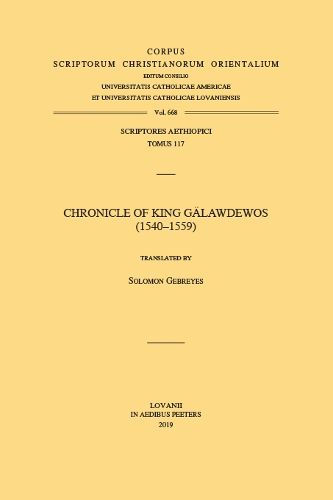Readings Newsletter
Become a Readings Member to make your shopping experience even easier.
Sign in or sign up for free!
You’re not far away from qualifying for FREE standard shipping within Australia
You’ve qualified for FREE standard shipping within Australia
The cart is loading…






The Chronicle of King Galawdewos (r. 1540-1559), reporting the nineteen
years of the king’s reign, is one of the most useful and significant
historical sources for the history of Christian-Muslim relation in the
sixteenth century of Ethiopia and the Horn. It represents a peculiar
text in Ge'ez historiography both because of its narrative structure and
the underlying sources used by the chronicler. Numerous Arabisms appear
in the text, which eventually suggest that the Chronicle was written by
a person with an outstanding knowledge of Arabic, in 1561. The book
presents a new critical edition based on all available manuscripts and
provides some detailed introductory notes and an English translation.
The new edition yields philological findings concerning the Chronicle of
King Galawdewos in particular and new inputs that call for re-editing
the Ethiopian royal chronicles in general. It also adds valuable by now
not recorded items for Ge'ez lexicography and corrects historical
distortions resulted from the previous edition. Above all, the work
provides a text-critically established edition of the Chronicle of King
Galawdewos accompanied by an up-to-date concisely annotated translation,
which offer new insights into the late medieval history and
historiography of Ethiopia and the Horn of Africa.
$9.00 standard shipping within Australia
FREE standard shipping within Australia for orders over $100.00
Express & International shipping calculated at checkout
The Chronicle of King Galawdewos (r. 1540-1559), reporting the nineteen
years of the king’s reign, is one of the most useful and significant
historical sources for the history of Christian-Muslim relation in the
sixteenth century of Ethiopia and the Horn. It represents a peculiar
text in Ge'ez historiography both because of its narrative structure and
the underlying sources used by the chronicler. Numerous Arabisms appear
in the text, which eventually suggest that the Chronicle was written by
a person with an outstanding knowledge of Arabic, in 1561. The book
presents a new critical edition based on all available manuscripts and
provides some detailed introductory notes and an English translation.
The new edition yields philological findings concerning the Chronicle of
King Galawdewos in particular and new inputs that call for re-editing
the Ethiopian royal chronicles in general. It also adds valuable by now
not recorded items for Ge'ez lexicography and corrects historical
distortions resulted from the previous edition. Above all, the work
provides a text-critically established edition of the Chronicle of King
Galawdewos accompanied by an up-to-date concisely annotated translation,
which offer new insights into the late medieval history and
historiography of Ethiopia and the Horn of Africa.